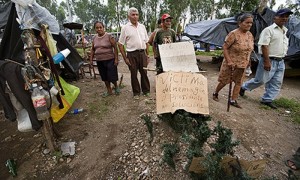Nicaragua, like many developing countries, is facing many environmental and health issues as it attempts to grow its economy. One place where environmental and health issues have collided in Nicaragua is in the country’s increasing dependence on pesticide.
Since the early 1950s, hundreds of different pesticides have been introduced in the Nicaraguan agricultural industry. In particular, the 1960s “cotton boom” saw an increase in use; pesticide companies established strong relationship with farmers and set up marketing campaigns in Nicaragua. One study on pesticides estimated that, on average, farmers sprayed pesticide on their crops 28-35 times a year in the 1960s and 70s. As a result, insects became resistant to the chemicals, which forced farmers to become more reliant on pesticides.
Until a United Nations investigation 1972, however, Nicaragua did not recognize or even realize their dependence on pesticide, and the negative side effects their use was having on humans and their environment; that year, the UN found that over 3,000 people had suffered from acute pesticide poisoning. Furthermore, other investigations found that the pesticides had contaminated local water and soil, and the overuse of pesticides had contributed to soil erosion.
Following these reports, Nicaragua began attempting to regulate the industry; unfortunately, almost all government attempts to regulate pesticides have essentially failed. Since the 1990s, pesticides have continued to result in poisoning, as well as cause significant environmental issues. Organochlorine, a chemical in many pesticides, has been found in the air, water, sediment, and many food products in Nicaragua. While those who actually use the chemicals are significantly affected, its effects have now spread to those who simply live near farms or eat the food they produce.
Overall, Nicaragua is facing a problem that many developing countries share: the tradeoff between health and economic survival. In countries that rely heavily on an agricultural industry, many subsistence farmers will do anything to ensure their crops grow to fruition, even at the cost of their own health and the environment; their crops are often their only source of income, and their only chance for their family to survive.
For more information, visit:
http://www.pan-uk.org/pestnews/Free%20Articles/PN89/PN89_p3-6.pdf
http://www.naturalnews.com/032683_Nicaragua_Nemagon.html

